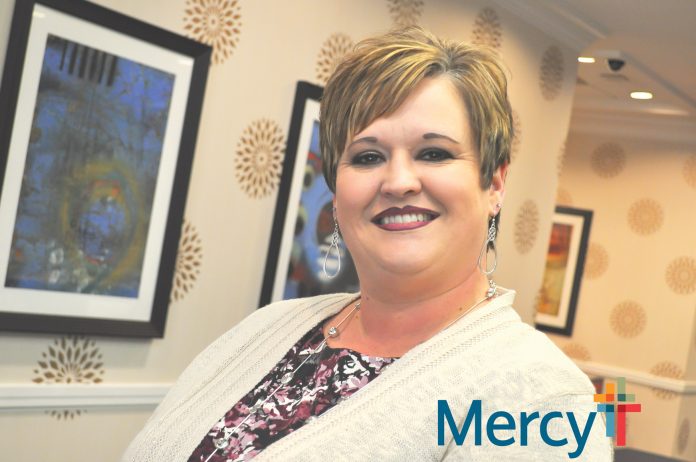by Bobby Anderson, Staff Writer
Like many, Karyl James, MSN, BSN, RN, Mercy Hospital CNO watched the frequent headlines marking deadly shootings.
And the reports of violence inside health care showed no signs of slowing down.
But what happens if the two scenarios combined? It was a question James and others in the Mercy system really didn’t want to think about, but one they knew they had to answer.
“With all the public shootings going on our safety team in collaboration with nursing said we have to educate and do something about it,” James said recently.
Through planning, discussion and scenarios Code Roscoe was born.
The code is Mercy-wide, so all 45 hospitals in the system use it for any active shooter situation.
Each unit must have at least two identified safe places that can prevent a shooter’s access to people.
“It’s not just nursing it’s registration, it’s all of those individuals. The front door of the hospital is registration so they need a safe place,” James said.
Planning for the unknown is a constant battle. Knowing who might have a gun is another.
A former ER nurse, James is familiar with both.
“Unknown was just kind of second nature for me and personally, I’ve had a gun pointed at me as an ER nurse many years ago,” James said.
It was an eye-opener to say the least.
“Yeah, I’m going to die. It was frightening,” James said of what flashed through her mind all those years ago. “He was not in his right mind and pulled out the revolver. Luckily, I had a police officer right next to me and he grabbed the gun.”
“The worst we can do is say ‘Oh, that will never happen to me because it might.’”
James knows working without a plan would shortchange everyone. That’s why she’s invested in the planning, hoping it will never be put to use.
The first drill that was run pointed out several instances where locking mechanisms didn’t work the way they should have.
The second time the code was called it wasn’t a drill.
“I got that call on a Sunday afternoon and I just froze,” James said of the scenario where the hospital locked down after a suspect in a nearby neighborhood was seen with a gun. “My stomach just sank because there was no drill.”
Out of instinct the first thing James did was call the house supervisor. That wasn’t protocol.
“The first thing you do is turn your phone off and text only,” James said. “I was the administrator on call.”
The house supervisor did answer and whispered to James she and several others were huddled under a table in the nursing administration offices.
“There was no lock on that door so they had the table pushed against the door,” James said. “The larger space you could just walk in. We’ve since put a badge reader on that door.”
Officials also learned the emergency locking button that seals all doors in the emergency department did not work.
“You could literally walk up and push open our ER so we got that fixed,” James said. “It really kind of opened our eyes to a lot of the safety measures we thought we had but really didn’t.”
Mercy has had Code Roscoe in place for nearly three years now. It’s evolved along the way.
“The reason I feel good about it is because the co-workers feel good about it,” James beamed. “After that actual event I went to the hospital after it was all said and done. It was a grueling 45 minutes because that was about how long it took for police to subdue the individual shooting in the neighborhood. I rounded on staff.”
“They knew exactly what to do. They knew where their safe spots were and the locks worked. They felt safer. For me, that’s a win.”
Planning for the unexpected is challenging to say the least.
“There’s always something new and I think you have to be flexible to understand you don’t have everything figured out and you never will,” she said.
“I get shocked every day with something new. Being open to accepting that and training as much as you possibly can for those bigger events – coworkers will figure out what they need to do and what is right to do for their patients and their safety.”














